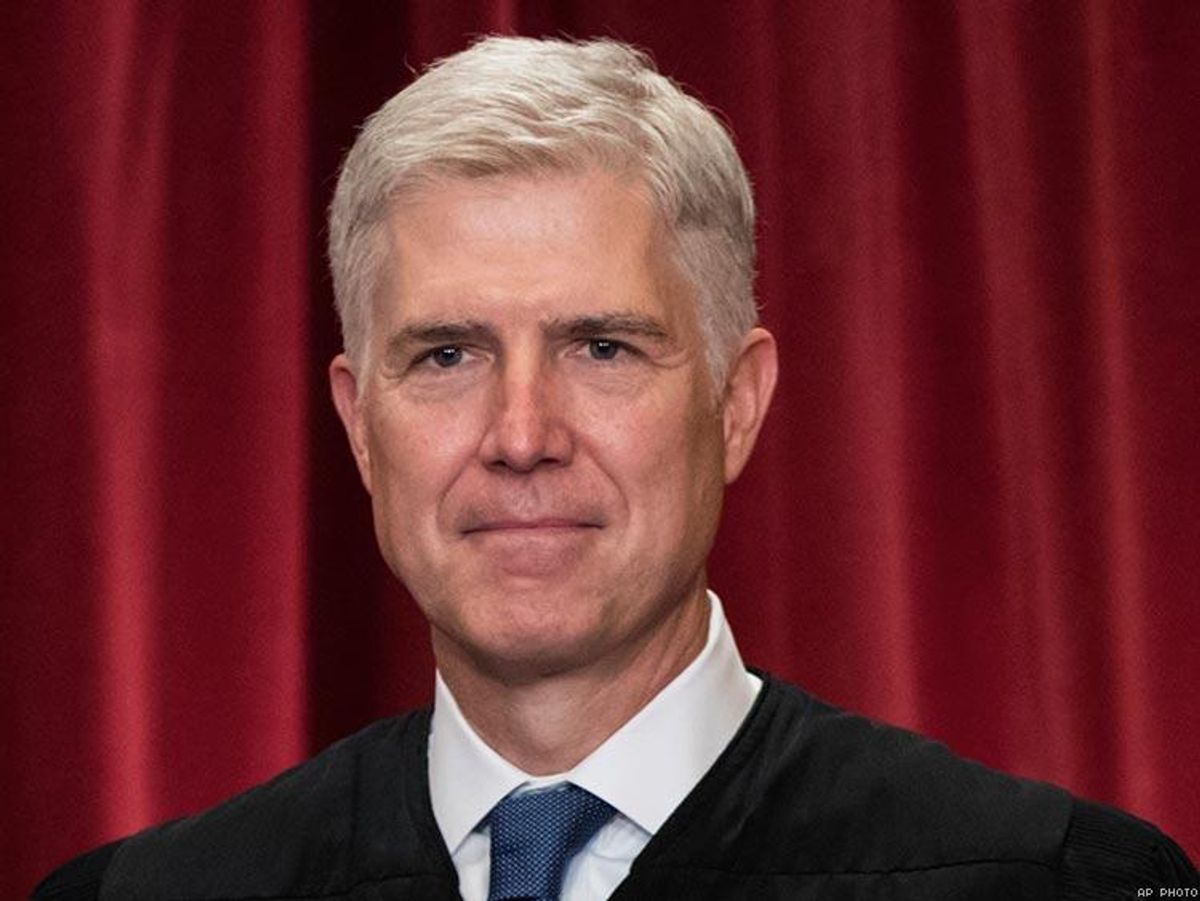In his confirmation hearings as a U.S. Supreme Court nominee, Neil Gorsuch tried to prove he's squarely in the judicial mainstream -- but now that he's on the court, he's proving to be just as far right and anti-LGBT as his opponents warned.
Gorsuch wrote the dissent from today's ruling in which the court's majority held that both members of same-sex couples have the right to be automatically listed as parents on their children's birth certificates. He also sided with the most conservative justices on Donald Trump's travel ban and gun rights.
(RELATED: Neil Gorsuch Opposed Marriage Equality in 2004 Dissertation)
In Pavan v. Smith, the high court reviewed an Arkansas case involving same-sex couples in which the state refused to list the nonbiological parent on a child's birth certificate without that parent obtaining a court order. For heterosexual couples, both members were automatically listed, even if one of them had no biological relationship to the child -- for instance, if the child was conceived through insemination by a donor other than the mother's husband. The Arkansas Supreme Court upheld that practice, but the U.S. Supreme Court today reversed that ruling by summary judgment, without even hearing oral arguments, saying it violated 2015's marriage equality ruling by denying same-sex couples access to "the constellation of benefits that the State has linked to marriage."
In his dissent, Gorsuch wrote that he saw nothing wrong with a "biology based birth registration regime" and that it didn't violate the Obergefell marriage equality ruling. To simply overturn that practice, he said, was an "overbroad remedy." He was joined in the dissent by Justices Samuel Alito and Clarence Thomas. However, the remaining member of the court's conservative wing, Chief Justice John Roberts, joined in the majority ruling.
The court announced today that it will hear another case involving LGBT rights,Masterpiece Cakeshop v. Colorado Civil Rights Commission, in which a baker is appealing a ruling that found him in violation of antidiscrimination laws by refusing to provide a cake for a same-sex wedding. It's unknown if Gorsuch was among those voting to take up the case, but the court declined to hear a similar case when his predecessor, the late ultraconservative Justice Antonin Scalia, was a member, ThinkProgress notes.
Also today, the high court allowed Trump's revised travel ban, involving travelers from six Muslim-majority countries, to go partially into effect, reversing lower court decisions to block it. This decision was unanimous, but Gorsuch, Alito, and Thomas issued a partial dissent, calling for full implementation of the ban.
The travel ban, enacted by executive order in March, blocks most new immigrants from Iran, Libya, Somalia, Sudan, Syria, and Yemen for 90 days and all refugees for 120 days, while the administration reviews vetting procedures. The court allowed this to go into effect, but with an exception for "foreign nationals who have a credible claim of a bona fide relationship with a person or entity in the United States," the decision reads. However, the partial dissent authored by Thomas and joined by Gorsuch and Alito said there should be no exceptions.
Although the ban will go into effect within 72 hours, its constitutionality will continue to be debated in court. While lifting the stay, the Supreme Court also agreed to give a full hearing this fall to the challenges to the ban, "leaving open the chance that it could reverse Monday's verdict if challengers can prove the ban is illegal or unconstitutional," USA Today notes.
And the court today declined to hear a challenge to California's restrictions on concealed weapons. California allows concealed carrying of firearms only if a citizen can show "good cause." County sheriffs enforce the law, and those in urban counties "have set a high bar for what qualifies as a 'good cause,'" the Los Angeles Times reports. The court majority saw no reason to review the law, letting stand an appellate court ruling that the Second Amendment "does not preserve or protect the right of a member of the general public to carry concealed firearms in public."
Thomas wrote a dissent in which he was joined by Gorsuch, saying the decision not to hear the case "reflects a distressing trend: the treatment of the Second Amendment as a disfavored right." He added, "The Constitution does not rank certain rights above others, and I do not think this Court should impose such a hierarchy by selectively enforcing its preferred rights."


















































































